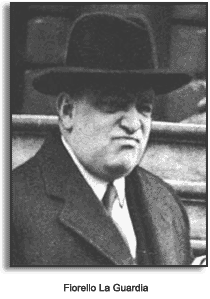Fiorello La Guardia was born in New York City on December 11, 1882, to an Italian Catholic father and an observant Jewish mother. The couple had emigrated from Trieste to the United States in 1880. Fiorello's first job was with the U.S. Embassy in Budapest in 1900. Later, he worked for the U.S. Immigration Service in New York City while he studied law at New York University.
La Guardia was admitted to the bar in 1910. In 1916, he became the first Italian-American elected to the U.S. House of Representatives. He belonged to the progressive wing of the Republican Party, opposing prohibition, supporting women's suffrage and campaigning against child labor. In 1932, he co-sponsored the Norris-La Guardia Act, which restricted the power of courts to ban strikes.
 In 1932, Franklin D. Roosevelt's landslide victory swept away many Republican members of Congress, including La Guardia. Undeterred, La Guardia was elected mayor of New York City in 1933. Over the next twelve years he developed a reputation as an efficient and honest administrator. A supporter of the New Deal, La Guardia expanded the city's social welfare services and initiated a program of low-cost housing. One of his best known remarks was that, "There is no Democratic or Republican way to clean the streets." La Guardia also became known as an early and vocal opponent of the Nazis. Standing five feet, two inches, LaGuardia was known affectionately as the "Little Flower."
La Guardia did not seek re-election as mayor in 1945. The following year he became director general of the United Nations Relief and Rehabilitation Administration. He died of cancer on September 20, 1947.
In 1932, Franklin D. Roosevelt's landslide victory swept away many Republican members of Congress, including La Guardia. Undeterred, La Guardia was elected mayor of New York City in 1933. Over the next twelve years he developed a reputation as an efficient and honest administrator. A supporter of the New Deal, La Guardia expanded the city's social welfare services and initiated a program of low-cost housing. One of his best known remarks was that, "There is no Democratic or Republican way to clean the streets." La Guardia also became known as an early and vocal opponent of the Nazis. Standing five feet, two inches, LaGuardia was known affectionately as the "Little Flower."
La Guardia did not seek re-election as mayor in 1945. The following year he became director general of the United Nations Relief and Rehabilitation Administration. He died of cancer on September 20, 1947.